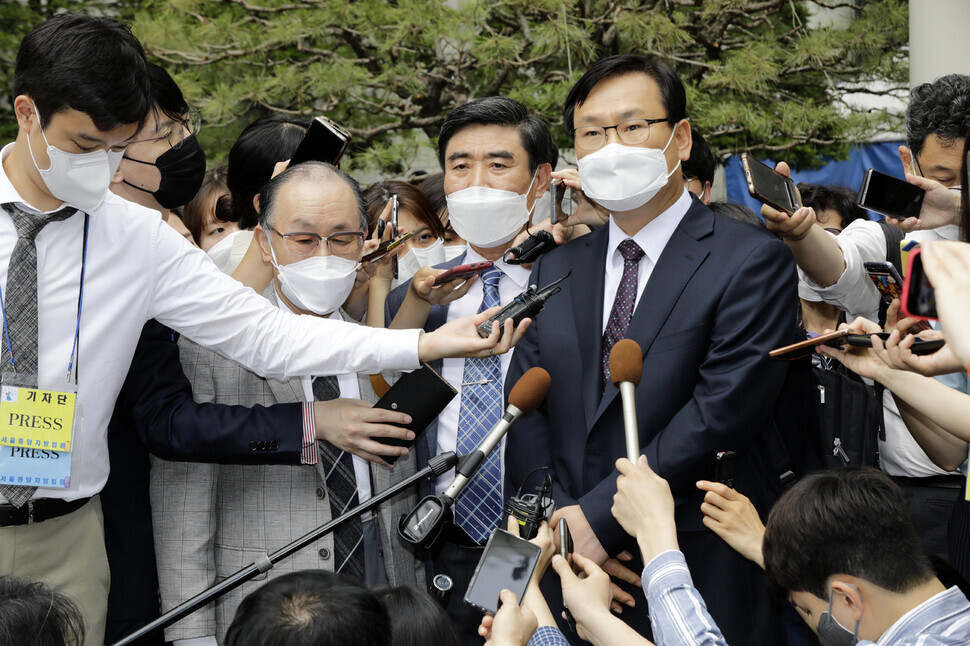hankyoreh
Links to other country sites 다른 나라 사이트 링크
S. Korean court dismisses forced labor case against Japanese companies, overturns Supreme Court decision

A South Korean district court has dismissed a personal damages lawsuit filed by victims of forced labor during Japan’s colonial rule over Korea. The court said the victims’ right to claim damages had been exhausted by a claims agreement reached by South Korea and Japan back in 1965.
A dismissal occurs when the court throws out a lawsuit without reviewing the substance of its claims because the suit fails to meet the minimum requirements. This district court faces criticism for taking into account the extralegal argument that poor relations with Japan could undermine South Korea’s alliance with the US.
On June 7, Kim Yang-ho, senior judge in the 34th Civil Division at the Seoul Central District Court, dismissed all lawsuits filed against 16 Japanese companies implicated in war crimes, including Nippon Steel and Mitsubishi Heavy Industries, by 85 forced labor victims and their surviving family members. This would have been the largest trial involving forced labor victims.
“The forced labor victims’ claims for damages are among those covered by [South Korea and Japan’s] claims agreement,” the court said.
The claims agreement, which former South Korean president Park Chung-hee reached with Japan in 1965, stated that all claims between the contracting states and their citizens had been completely and finally resolved. The court found that this agreement also applies to the individual right to make claims.
That directly contradicts the South Korean Supreme Court’s en banc ruling in October 2018 in a lawsuit filed by four forced labor victims, including Lee Chun-sik, against Nippon Steel. The Supreme Court upheld a lower court’s ruling in favor of the plaintiffs, concluding that South Korea and Japan’s agreement shouldn’t be regarded as having exhausted the victims’ right to make claims.
That casts doubt upon the prospect of this district court’s ruling being upheld on appeal.
Significantly, the court said that if the plaintiffs won their lawsuit and the Japanese companies’ assets were seized, it would damage relations with Japan and “ultimately might damage relations with the US, which are directly tied to our national security in the form of the South Korea-US alliance.”
That prompted MINBYUN-Lawyers for a Democratic Society to release a statement calling the ruling “contrary to reason and common sense.”
By Shin Min-jung, staff reporter
Please direct comments or questions to [english@hani.co.kr]

Editorial・opinion
![[Editorial] Penalties for airing allegations against Korea’s first lady endanger free press [Editorial] Penalties for airing allegations against Korea’s first lady endanger free press](https://flexible.img.hani.co.kr/flexible/normal/500/300/imgdb/original/2024/0502/1817146398095106.jpg) [Editorial] Penalties for airing allegations against Korea’s first lady endanger free press
[Editorial] Penalties for airing allegations against Korea’s first lady endanger free press![[Editorial] Yoon must halt procurement of SM-3 interceptor missiles [Editorial] Yoon must halt procurement of SM-3 interceptor missiles](https://flexible.img.hani.co.kr/flexible/normal/500/300/imgdb/child/2024/0501/17145495551605_1717145495195344.jpg) [Editorial] Yoon must halt procurement of SM-3 interceptor missiles
[Editorial] Yoon must halt procurement of SM-3 interceptor missiles- [Guest essay] Maybe Korea’s rapid population decline is an opportunity, not a crisis
- [Column] Can Yoon steer diplomacy with Russia, China back on track?
- [Column] Season 2 of special prosecutor probe may be coming to Korea soon
- [Column] Park Geun-hye déjà vu in Yoon Suk-yeol
- [Editorial] New weight of N. Korea’s nuclear threats makes dialogue all the more urgent
- [Guest essay] The real reason Korea’s new right wants to dub Rhee a founding father
- [Column] ‘Choson’: Is it time we start referring to N. Korea in its own terms?
- [Editorial] Japan’s rewriting of history with Korea has gone too far
Most viewed articles
- 160% of young Koreans see no need to have kids after marriage
- 2[Editorial] Japan’s rewriting of history with Korea has gone too far
- 3Presidential office warns of veto in response to opposition passing special counsel probe act
- 4[Editorial] Penalties for airing allegations against Korea’s first lady endanger free press
- 5For survivor, Jeju April 3 massacre is a living reality, not dead history
- 6[Column] Park Geun-hye déjà vu in Yoon Suk-yeol
- 7Hybe-Ador dispute shines light on pervasive issues behind K-pop’s tidy facade
- 8[Special Feature Series: April 3 Jeju Uprising, Part III] US culpability for the bloodshed on Jeju I
- 9[Column] America must frankly own up to role in tragic Jeju April 3 Incident
- 10‘My mission is suppression’: Jeju blood on the hands of the US military government